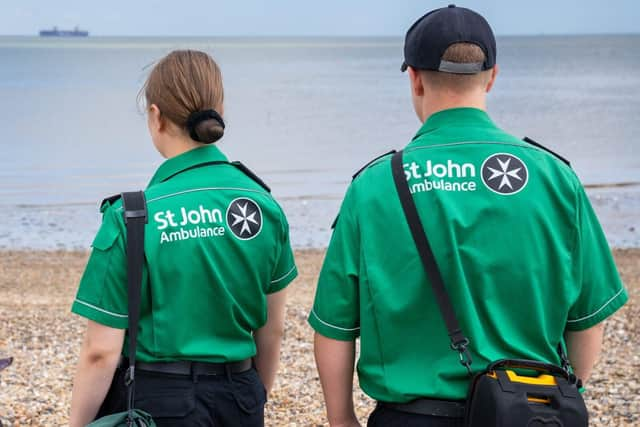Dive in, but stay safe: St John shares first aid tips for this year’s “Festive Dip”
and live on Freeview channel 276
Over recent years, wild swimming in winter has seen a surge in popularity, with people of all ages enjoying the physical and mental health benefits. A survey by Outdoor Swimmer found over 65 per cent of its readers chose to exercise at local beaches and lakes during the colder months.
But, whether you're a seasoned "Festive Dipper" or trying it for the first time this winter, St John is urging swimmers to be aware of the dangers of cold-water shock. This natural response occurs when the body is suddenly exposed to water at 15 degrees or less.
Advertisement
Hide AdAdvertisement
Hide AdMatthew Booker, Associate Medical Director for St John Ambulance, advised: "We want everyone to enjoy this great tradition safely, so we're encouraging people to do their research and plan ahead, pack warm clothes and something hot to eat or drink to warm up quickly after exiting the water. By following a few simple steps, you can help reduce the risks of cold-water shock developing into something more serious."


St John Ambulance recommends:
- Take your time when submerging yourself in the water and splash water on your face as you get in. Also, check water temperatures and tides in UK coastal waters through various websites.
- Even strong swimmers can experience cold-water shock, so wear a tow float, or bring something you can lean on. A bright swimming cap will also make it easier for you to be found if you need help. Don't forget to let someone know where you are and go with a friend for added safety.
- If you start to feel panicked in the water or experience difficulty breathing, roll onto your back. Although the natural instinct may be to swim to shore, rolling onto your back and lengthening your exhales will help you relax and call for help. If possible, exit the water and warm up quickly to avoid hypothermia.
- Lastly, it's important to bring warm clothes and a hot drink for after. And remember, alcohol can worsen the situation, so it's best to avoid it.
Recently, sewage pollution and water quality emerged as one of the main barriers for people wanting to participate in the sport. With over 41 per cent of respondents, in Outdoor Swimmer's survey, naming this as their biggest reservation to entering the water.
Matthew said: "I'd recommend taking some simple precautions to minimize health risks associated with swimming in potentially contaminated water, which can cause a range of illnesses from minor infections to more severe gastrointestinal ailments and even hepatitis."
To stay safe, St John Ambulance encourages swimmers to use common sense, avoiding stagnant or cloudy water, algal blooms, and foul-smelling areas. Look out for warning signs and avoid discharging outlet pipes. Utilising resources from local swimmers and websites like the Environment Agency's "SwimFo" interactive data can also provide valuable information.
Advertisement
Hide AdAdvertisement
Hide AdCover any cuts with waterproof plasters before entering the water, practice good hygiene by thoroughly washing yourself after swimming and before eating, and exercise extra caution after heavy rainfall when waterways are more likely to be polluted.
If you do feel unwell after swimming, your local pharmacist can give advice about minor skin, ear, eye or gastrointestinal symptoms. Matthew added: "But, if symptoms persist or are severe, seeking medical advice is essential. Swimmers should also consult a healthcare professional if they experience flu-like symptoms after open water swimming, as Weil's Disease (leptospirosis), although rare, can be a potentially serious infection contracted from watercourses."
Outdoor Swimmer Founder Simon Griffiths says: “It is incredibly disappointing that our waterways continue to be contaminated by sewage spills. Everyone seems to know or have heard about someone who has got ill after swimming.
“However, the vast majority of open water swims do not result in illness. Our advice is always, be prudent and stay alert to the hazards, but don’t be put off swimming. There are many health, fitness and wellbeing benefits to getting into natural water, and these far outweigh the risks.”
Advertisement
Hide AdAdvertisement
Hide AdSt John Ambulance volunteers will be on hand to keep those participating at some outdoor swimming events throughout the Christmas and New Year safe. But for more information on how to protect yourself this winter, and your loved ones, visit www.sja.org.uk.
Notes to editors:
Outdoor Swimmer has listed 39 organised Festive Dips around the UK but says many more people will also be taking part in informal dips with friends and family.
Seven smart swimming hacks:
- Submerge yourself slowly in the water. Splash water on your face as you get into the water – and stay within your depth until your breathing is under control.
- Check water temperatures in UK coastal waters through various websites - don’t forget to check the tides too.
- Wear a tow float or bring something you can lean on – even strong swimmers can experience cold water shock.
- Wear a bright swimming cap – this will make it easier for you to be found if you need help
- Never swim alone and make sure someone knows where you are
- If you do start to feel panicked in the water or start gasping for breath roll onto your back – the temptation will be to swim to the shore but by rolling onto your back and lengthening the exhales you will begin to relax and be able to call for help. More information on what to do if you are in difficulty in the water can be found on the RNLI website. If you can exit the water, do so and try to get warm quickly to avoid hypothermia.
- Bring warm clothes and a hot drink. Avoid alcohol as this can make the situation worse.
Latest 2023 trends in wild swimming – survey by Outdoor Swimmer.